When discussing modern classics of the board game hobby, one quickly ends up talking about 2013’s Concordia. While its theme of trading in the Mediterranean nowadays is considered a cliché of the hobby and a synonym for unremarkableness, the gameplay of Concordia is far from it. In fact, Concordia can be seen as a master piece in polishing and balancing a game’s design. Its whole ruleset fits on a single double-sided sheet of A3, including examples, but the amount of depth and replayability that derives from it is astounding.
I set down with fellow Hamburgian Mac Gerdts to chat about the history of Concordia, how the PD Verlag became home base for all his games, designing games as a hobby instead of a job, the importance of polishing on the last stretch before a game’s release, the most recent expansion Roma / Sicila, and much more. Quite typical for a German northerner, Mac has a great dry sense of humour and often speaks with a tone of understatement, especially considering all the success he has had with his designs.
The conversation was held in German and roughly 80min long. As a result, some undertones might have gotten lost in translation or some smaller tangents been left out during editing for the purposes of readability. But as always, I’ve tried to make this as faithful a rendition of the conversation as I could. Any mistakes or omissions are likely mine, not Mac’s. Enjoy the read!
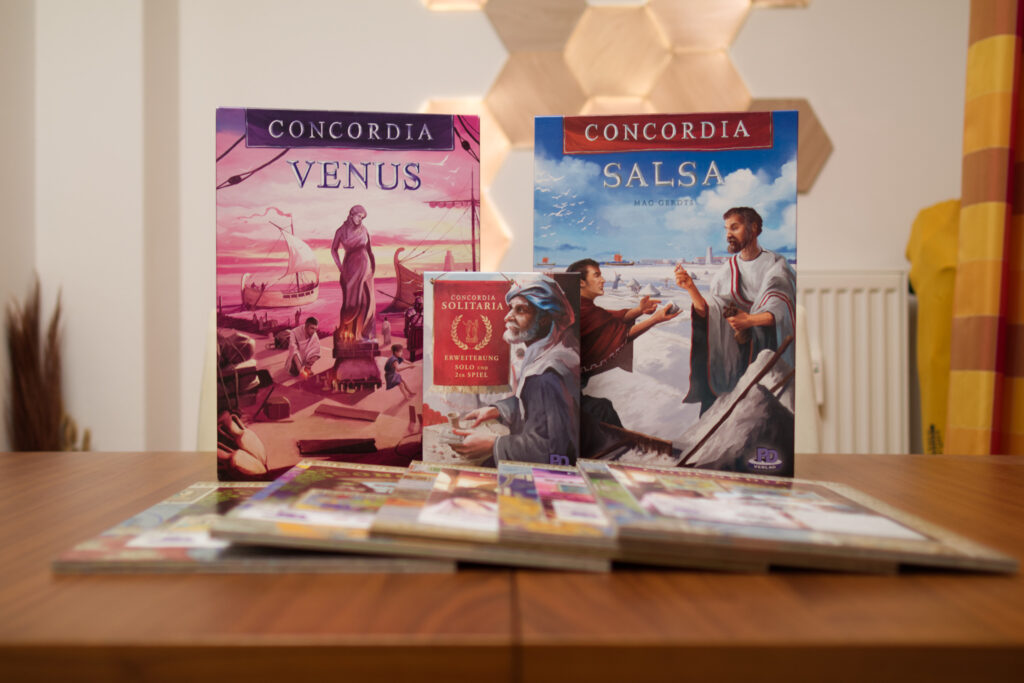
The Beginning
Concordia is a quintessential classic of the board game world: basically everyone has heard of it, a top position in the BGG charts, it’s still relevant after so many years. In fact, this year we’re celebrating the tenth anniversary of the release of Concordia. So it’s particularly nice that we have the chance to talk about it now.
I would like to start at the very beginning: what’s your first memory of Concordia and why did you want to create it? What was the fundamental idea behind it?
The fundamental idea was to create a trading game in antiquity. The first idea was a game set in the near orient where players would build caravans and trade routes between cities and then control craftsmen within the cities that work for them. There were quite some birthing pains as the first prototypes weren’t that much fun and also didn’t really work.
I started working on the first first ideas in 2010 and it was released in 2013, so it actually took 3 years to get Concordia to a state where it was so polished it became a fine game. The game originated from its theme, same as pretty much all my games do.
Why antiquity? Nowadays trading in the Mediterranean is a cliché that a lot of designers try to avoid. What attracted you to that theme that you specifically wanted to create a game set in it?
I was always interested in antiquity. In general, I’m very much interested in history. My very first game even is called “Antike” [German for “antiquity”] and I had seven years of Latin at school [both laugh] and so was interested in history and liked the theme.
Did choosing this theme prompt you to do any kind of research, like buying books on the topic, traveling to places to see what they were really like?
No, it didn’t turn into a reason to do a dedicated vacation. For Antike, I actually did travel to Turkey and visited old antique cities, bought replica coins, did some research. But for Concordia, it was mostly books and movies.
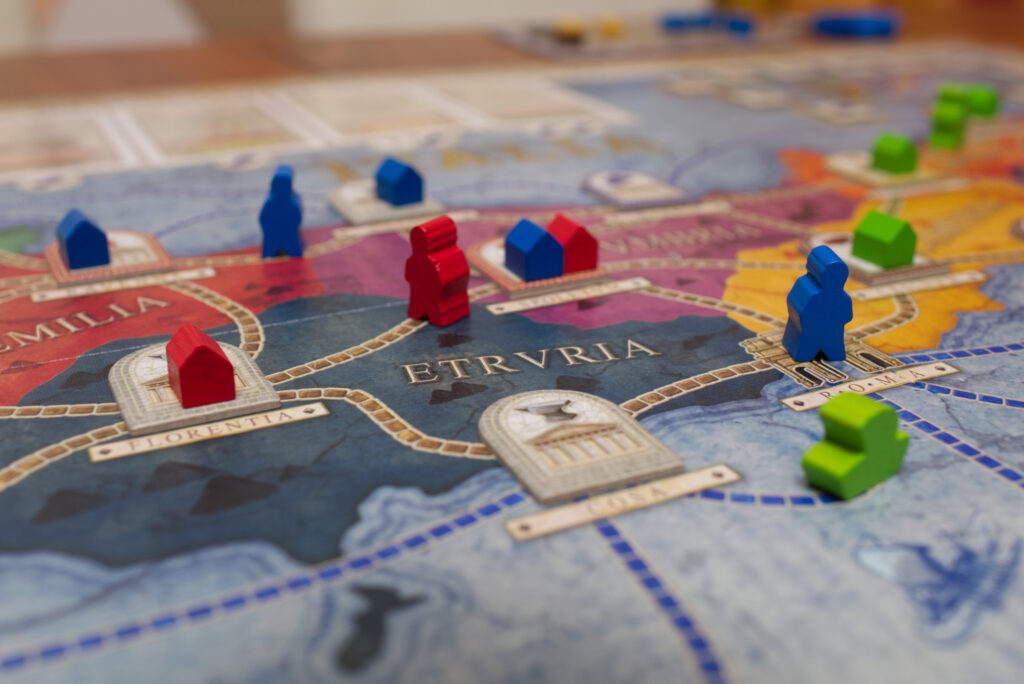
How did you perceive the board game hobby at the time? Did you see a gap in the market, were there trends you wanted to follow? Or were you completely independent with your own game?
I didn’t do any “market research” or considerations what might be received in which way. For me, it’s important that I like it. I don’t really search for a gap, and it would be difficult: virtually for every topic, there already exists a good game. Every year, hundreds of games are released and it’s basically impossible to do something thematically that hasn’t been done before.
I thought perhaps you played something among friends where you liked certain aspects that you felt you could improve on.
No, I can’t say that. The very first idea was just to create a trading game with connections between cities, craftsmen with different professions. That evolved into people which evolved into cards, and then one did certain actions with those cards. It all evolved over time.
The card mechanism itself is actually quite simple in Concordia: you play a card and do what is written on it. That in its pure form wasn’t common though at that time. I can’t think of a game that previously did this and so [jokingly] it was received quite okay. [Alex laughs]
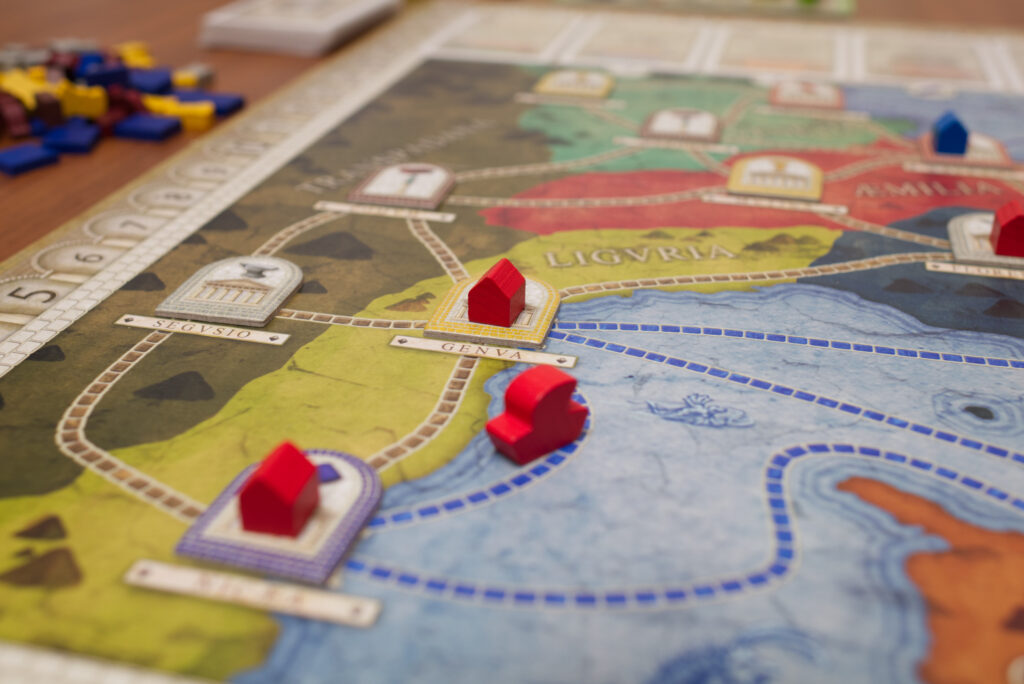
Design Philosophy
Before we talk about mechanisms, how should I imagine your working life at the time? How much time did you have to work on the game?
It was very irregular. I have a day job working as an economist and am a father and family man, work in the garden and on the house, etc. It’s a hobby, not a job. It from time to time happens though that I move things around in my head and think about mechanisms and solutions when I’m under the shower or while riding my bike. When I get an idea, I write it down in my notebook and then in the evening sit down to craft a nice prototype. That’s one thing.
The other thing I always practiced in game development is to write down the rules. Try to write them down, change them, rewrite them from scratch, and make them as simple and as easy to understand as possible. I’m not a fan of extensive rulesets but instead appreciate it when the rules themselves are kept simple and the variety and depth result from the opportunities and combinations they create.
That’s very interesting. I’ve never heard it expressed like this before. Is it almost a design constraint for you to create games where the rules are so simple that it’s actually feasible to constantly rewrite them because there aren’t so many?
Yes. When writing down rules, you sometimes realise which parts are complicated and where there is friction or where you have to explain things in a weird way. And then you think: “there might be an easier way”. I try to create rules which have few or no exceptions, universally applicable rules.
Nowadays, we rather have a trend where additional mechanisms are added on top of others. By writing it down, you force yourself to keep things compact.
Yes, yes. The ruleset of Concordia fits on only four pages, including examples!
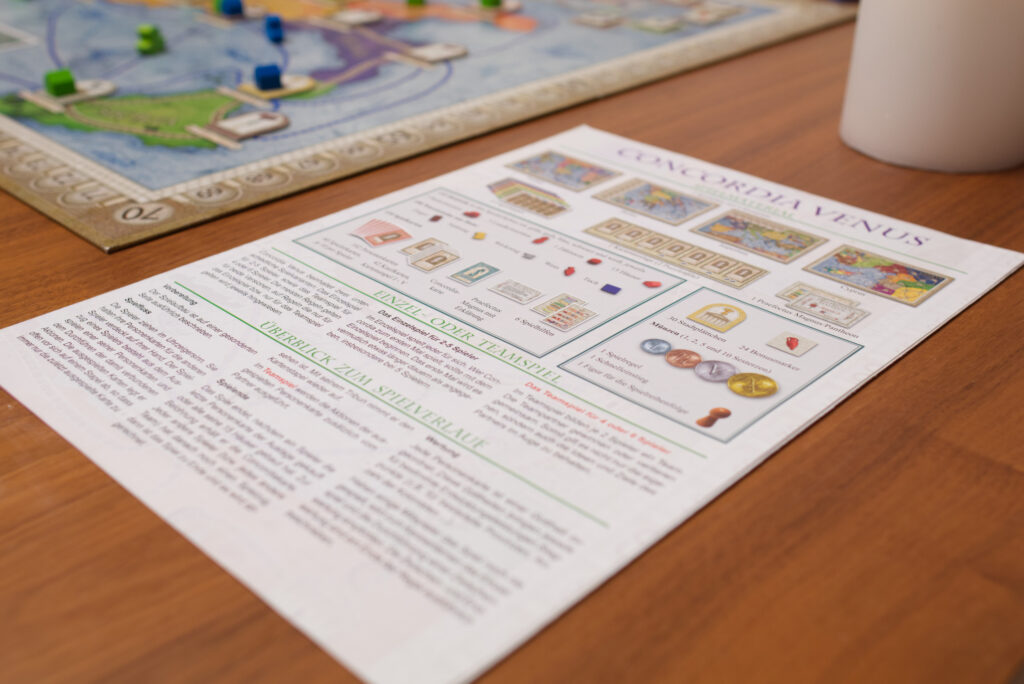
Yes, it’s a bit unsettling. [both laugh hard] Lately in particular, I’ve played a lot of Kickstarter games and you have something like a Voidfall with – I don’t know – 40 pages of rules. So I recently find it refreshing when I bring a game to the table and it’s “only” 8 pages of rules. With Concordia, one opens the box, unfolds that one page and thinks “That’s it? On the backside are already the English rules!”. That’s remarkable.
That’s also part of the success of Concordia. To learn how to master the game requires a number of plays, but the rules themselves are not that many. If you have played it once, you shouldn’t need to re-read the rules but be able to play. The cards also say what one has to do. With many other games where I used a roundel, it’s printed on the roundel. You walk through the different actions – and it’s never more than seven different ones on 8 squares. So it’s 7 different actions that make the whole game.
A build-in player aid.
Yes. For Imperial, there is a small player aid included to tell what to do in which case. I always like it if one can play without having to have the rulebook close by, or only on first play. That makes it easy to get into a game which certainly is also part of the success of Concordia.
There are many other great games. One I particularly like is Great Western Trail, or Arc Nova to name a more recent one. But if you sit down and try to teach it, it takes an hour until you can begin playing the game. I think if its avoidable, one should avoid that. Those are great games, but not my style.
Can you describe what the first prototype looked like? Were there additional elements that you later removed?
There were many, many iterations. The workers and the many professions turned into the action cards that in combination with the deities turned into victory points.
Where those pieces on the board?
No, they were cardboard tokens you would buy and place in front of you. And there could be multiple of those in a city and trade relations would be established between the various cities.
Oh wow, that sounds way bigger and more complicated!
Yes. I’ve always tried to reduce to the essence. As little exceptions as possible and as little as possible accessories. Antike is also an example for this. It’s a civilisation game where you have an economy. You establish something, you fight, you have technological advances, and everything is very much reduced. If we compare it to the original Civilization that is decades old – an extensive and long game – compared to that Antike tried to extract the basics and create a game out of them. For some, it’s too reduced. It’s not for everyone to play it like that.
I started building prototypes in the seventies and tested them with my friends from chess club. The first few were games that took like 5-6 hours to play [both laugh]. Or rather after 5-6 hours we were so exhausted that we aborted them. Those went on forever.
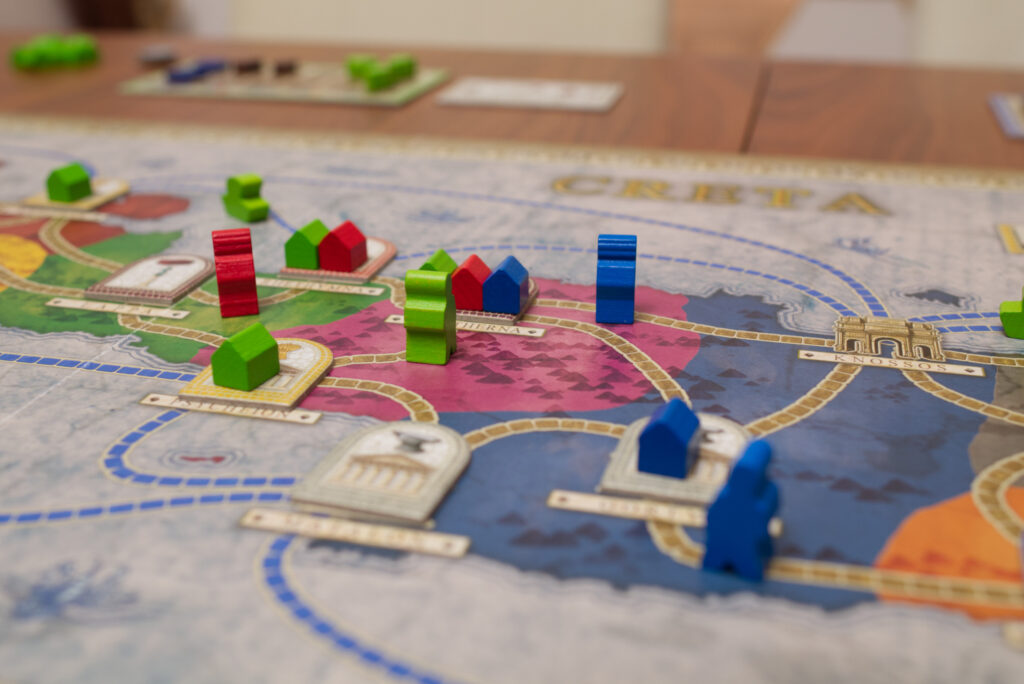
When I wanted to get something published and showed my games around, I realised that my original style that was popular with my friends from chess club wasn’t to everyone’s liking. When you go to public board game nights, too many will struggle. You have to reduce the play length. A game where everyone has 20-25 turns, that’s completely sufficient. And then have simple and short turns.
If you have a turn that consists of multiple parts – first you earn your income, then you build something, and so on, and so on, and then it’s the next players turn – such games also exist. First the downtimes is long and second the variance is lower because everyone basically does the same actions in the same order. If you split it up into multiple single actions that you can mix, you have way more possibilities, way more iterations. In chess, you also just move a rook or pawn and then its the other player’s turn.
I believe Concordia was the first game where I had heard the term “micro turns”. Like “oh, it’s my turn again? I just went!”. Compared to your chess friends, what was it that made the games fail with other players: the number of rules or the complexity of the turn?
It’s wasn’t the amount of rules. What we played didn’t have that many rules either. It was simply the play length until you had build up something for yourself. Take for example Imperial which was published after Antike in 2006. The original version was from 1983 where I had created it and played it regularly. But it played completely different because there was a whole economy behind it. There was farming, mining, shipyards, arms industry, and they produced something that you then traded among each other. And then you could trade them across borders, and the government could set tariffs. And loans for the nations weren’t bought for fixed rates but auctioned off. So there were crazy long auctions that happened. In aggregate, it was way too long for the mass market.
The Design Process
Did you have a concrete vision for Concordia? You needed to reduce something, but what did you want the players to think about? What was the core of Concordia you wanted to work towards to?
The game it ended up as I didn’t envision when I started three years earlier. Things just developed. In endless playtest rounds with different people I noticed where there was friction or people had a question, had a critique – which is very important. I’m always very grateful for critique, if someone says “I don’t like this” or “that’s difficult for me” or “you didn’t solve this well”. I take that as a motivation to improve things. How it developed couldn’t be foreseen in the beginning. Things played out over time.
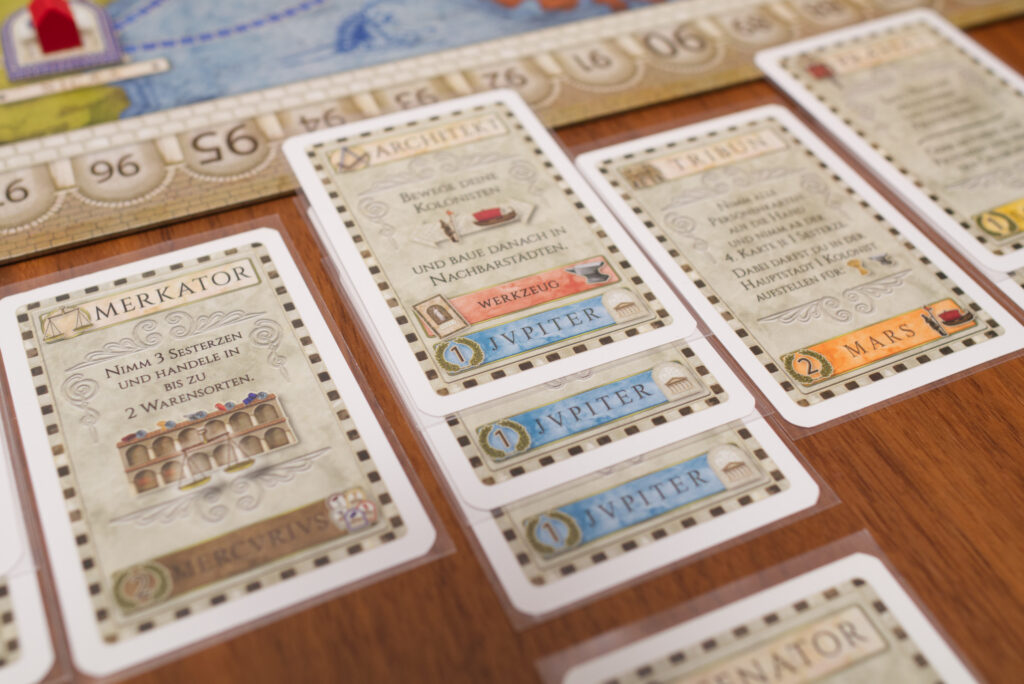
There are a number of essential decisions in the design, for example the genius idea to say you’re not only buying new actions – something a lot of games would have been happy about if they would have had that mechanism – but you also combined it with the victory criteria.
That was a tweak where at some point I though “well that’s something one could try” [Alex laughs] and then in the end it worked. It needed to be balanced – it wasn’t so in the beginning – but as a mechanism, it seemed promising, combining two things together. The base mechanism to play a card and play what is written on it was something I had done before, but from the top of my head I don’t know a game before Concordia that did it in that fashion. That by itself is already nice. Combining that with victory points, that’s the spin that makes the game truly challenging.
Can you remember how it came to be? Did you have the idea while you were – lets say – shopping or was it derived from some player feedback that the victory conditions you previously had weren’t exciting enough?
It’s essential as an author that you have good play testers. That you have people that don’t fall down in reverence in front of the author but without remorse critique him and tear part when something isn’t right. It’s good to have people that approach things very analytical, Frank for example is a mathematician, he is very good with combinatorics. Other people play by gut feeling, it also important to have those, and then to test everything in different groups and different countries on how it is received.
After such a session you discuss and people say “I don’t like that”, and you take a general mood from it. Then I let it sink in and at some points it starts to rumble in my head: what could one do? And then you test something and next time you present it, it works or it doesn’t.
It’s the last few meters that make a good game. It’s like a diamond that at the very end needs to be finely polished. A game that’s working okay is nice, but there are hundreds of them. The polish in the end, that’s decisive.
Concordia is the almost stereotypical example of elegancy: few rules, lots of resulting complexity.
And it is a nice system to build upon.
Even that! How did you decide on what was too much minimalism and how much was not enough? As an example: the whole mechanism that the colonists start in the storehouse and that buying a colonist not only provides the colonist itself but also more storage room, it could have been the colonist just lying in a supply somewhere.
Originally, there was a storehouse that had 8 units of storage and you needed to pay some amount of resources and money to increase it. You flipped it over and on the reverse was a storehouse with 12 units. That was how it was originally. And the colonists that you could buy somewhat lay next to it … [both laugh hard]. So I tried to put them on there and take them off there, and that worked well and proved itself.
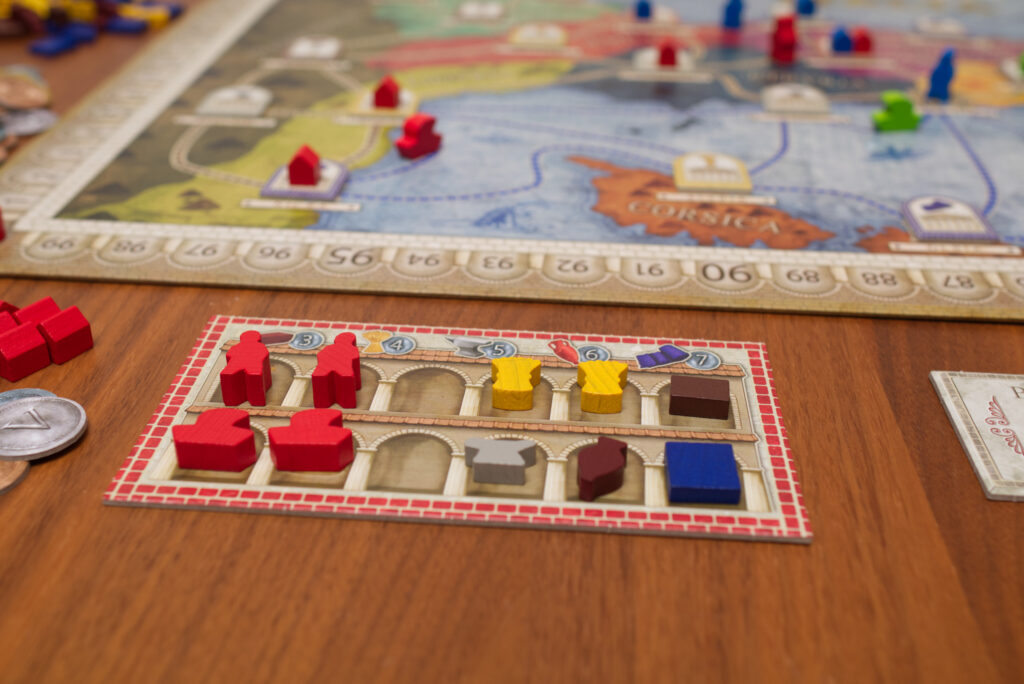
I still remember the first time I played Concordia, I thought “well that’s a clever idea”! I hadn’t seen this before, there were no additional components, it combined different mechanisms without any additional rule. Things got simpler but also better by it. So I was always curious how you got that particular idea.
Well there are many games where you unlocks something by taking something off, that happens frequently.
But they are rarely things that are so otherwise unrelated. Colonists fundamentally have nothing to do with the storehouse.
Yeah, well, thematically it might be a bit weak [both laugh] but it works great!
I also talked with Martin Wallace about the number of resources in a game. You have 5 in Concordia. Were there ever more or less?
There was actually a different resource, I believe there was one more. And then I tried how it plays with one less, is it still interesting? And if it is still interesting enough with one less, then you can also play with one less. If in doubt, better to have one less instead of adding one more just to have more resources.
I always wondered which role wine plays. Bricks are obvious, one needs a resource to build cities with. Corn and tools for the colonists, okay, could have been one but still I can understand that. Cloth was always what you used to make lots of money.
That’s the luxury good, yes.
Right. So why did Concordia need wine?
Because wine in antiquity was a widespread trade good, so it came from the theme. And what does it relate to? With wine you buy the Prefects and Mercators and those are the traders and the administrative people, those like wine.
At one point, we added an alternative card market that put a bigger role on wine because one could have argued that it was a bit underpowered before. Cloth is definitely the favourite, and wine is an in-between between cloth and the other resources. The alternative market raises the importance of wine.
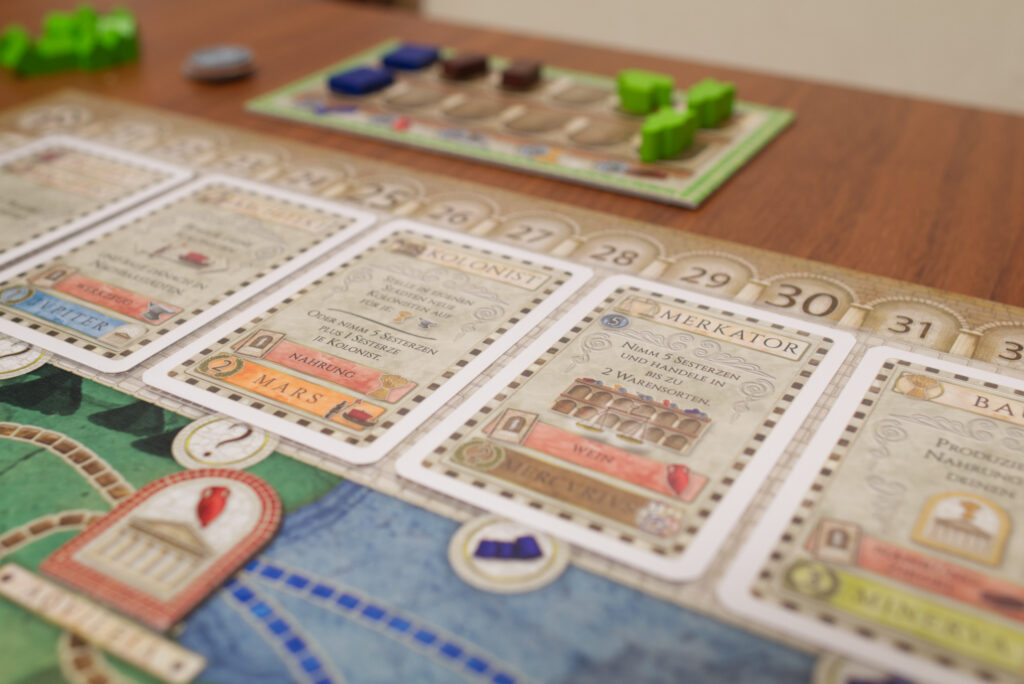
I was surprised that the latest expansion Roma / Sicila comes with the cloth-market and not the wine-cloth-market.
Yes, but of course you can play with the other market if you buy the respective expansions it comes with. Any version of Concordia can be played with it if you want to, same as one can combine everything in Concordia with the fish market that came in Balearica, or with Salsa. There are many elements that were introduced in the various expansions and all of them are designed to be combined with everything else.
I had always wondered if you had integrated wine because of the theme and then there was feedback it was underpowered, so you changed the market to balance the game and that would be the new standard. But it appears to not be so.
Yeah, that’s where we have to stick to traditions. [laughs] One can use the “new standard” but it also works well if it’s just the cloth.
Which one do you prefer? If you have the choice, which market do you use?
I usually always play with the standard market. Since the release of the digital version by Acram Digital, you can play Concordia as a computer game, purchase it in the PlayStore and play it on mobile or PC. That’s a very nice version and I play it on my mobile phone. There I keep in shape with regards to Concordia.
So you still enjoy playing Concordia? There are designers that after extensive play testing aren’t interested anymore in playing their game.
Yes, really. The replay value for myself if very high. I like to play the smaller maps and perhaps Britannia, with four opponents and all on the highest level. And if I win under those conditions, I rejoice. [both laugh]
There is this “natural cycle” in Concordia. Someone who doesn’t know the game and reads the rules will do the architect as their first move, prefect as second to produce resources, then sell, buy cards, and then the cycle continues. When you designed the game, were you concerned that players might be “trapped” in this cycle. And what are good openings in your mind? Do you sometimes directly go for the card market?
It’s like in chess where you don’t start with one of the outer pawns. You try to conquer the centre. So there are a number of standard openings, in Concordia it’s usually the architect. Or rather one plays the architect and the rest use their diplomats to copy it. And then multiple players end up in the same province and someone else does not, and that creates differences between the players’ situations.
At the latest when players start buying cards, things diverge and basically no standard exists anymore. Each player developers into a different direction, not only on the map. Players build in different cities, have different resources, one is missing the corn, the next didn’t get access to a cloth city. As a result, it happens rather quickly that everyone plays the same game but faces different challenges while still being in competition with each other.
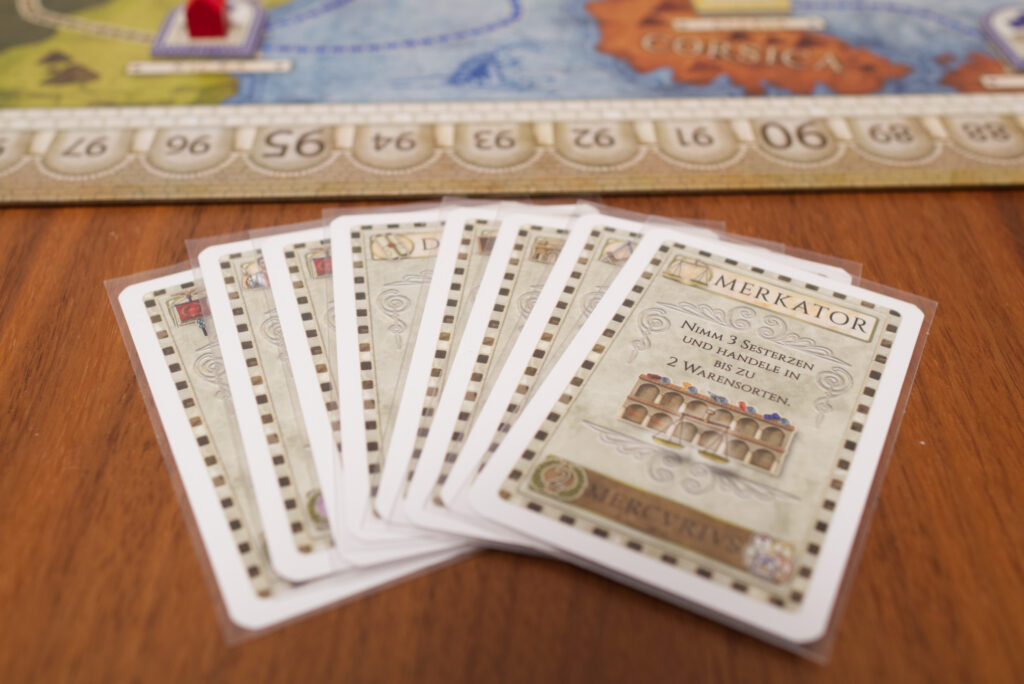
Balancing & Polish
In your experience, is it particularly good to be first or last in turn order? If you could choose, where would you like to be in player order?
That’s truly balanced! I like being last because I can use the Prefect Magnus to have a high production and I have more money. The double production is a nice boost. But then I am at a disadvantage because usually all the good building spots will already be gone, especially when playing with many players. As first player, you can have your pick. But if you want to build in a cloth city, you cannot afford a second city because you’re lacking the funds.
So in my opinion – and experience validates that – there is no preferred position in turn order but that it is fairly well balanced. The mechanism of Prefectus Magnus, which goes counter-clockwise starting from the last player (and acting as a tie breaker), that’s also a fine thing. It’s simple rules-wise but provides a good balancing.
For me, that’s what makes Concordia special: the amount of small, beautiful tweaks. One could imagine Concordia as an even simpler version, but then so much would be missing: the colonists and the warehouse, the Prefect Magnus, etc. I remember the first time I played Concordia and someone explained to me “you have this thing and it travels counter-clockwise” and I thought okay, that I didn’t see before! Was that a result of play testing? Can you still remember how you came to that idea?
I can’t remember that, it all happened ten years ago. But it certainly is something we discussed and I don’t know who had the idea, if it was me or perhaps someone else, but at some point the Prefectus Magnus was born.
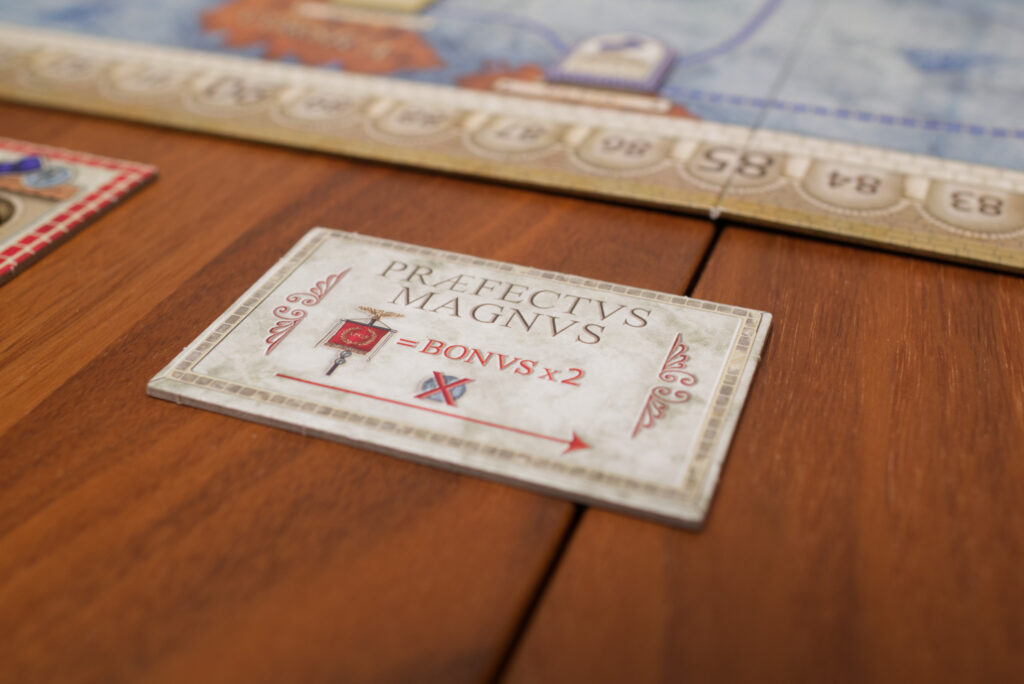
Another element I found interesting is the retrieval of cards. In many games like for example Anno 1800, players sit out one round to get their actions back. In Concordia you even reward doing so. It’s a way to get money, you can even build another colonist if you have the resources.
But it’s still not a particularly appealing move! Take the income mechanism: you gain more money the longer you wait, not even proportional to the number of turns you waited but disproportionally because you don’t get anything for the first three cards. For the first four, you get one buck, which isn’t much, it’s like quarter of a buck per turn. Even if you pick your cards up after the 8th turn, you get 5 – that’s more than half a buck per turn – but it’s not very attractive to do it because it gives players an incentive to work out good combos of cards and try to achieve good things before you pick up all cards again with the Tribune.
Do you still remember how all of those functions ended up being integrated in the tribune? Did you see people use it too often so you added the income part? Or why can one buy a colonist when playing the tribune?
That’s a necessity because the colonist card is an action you have to buy, you don’t have one as part of your starting hand. You must be able to buy colonists even if you don’t have the colonist card.
But you could for example have added a card, giving each player a colonist on the starting hand.
Yes, one could have done that. But this way it works with one card less. [both laugh]
Another example I remember in this context: originally, the architect’s movement and building were separate actions, separate cards. At first we played it like that: you move with one card and then build with another. But those are two things that are so connected that one can put it onto the same card, especially because there were moments of frustration: you have the goal of building somewhere, move there, and then someone else builds there. That’s not nice. A game shouldn’t only create frustration.
So those two separate cards were simplified to one card as it fit together thematically that you can build immediately. Otherwise you’d lose a turn, perhaps even without anyone intentionally trying to hurt you. That’s not nice. It’s nice to be able to plan those things as one move with the architect. Move, build, one card.
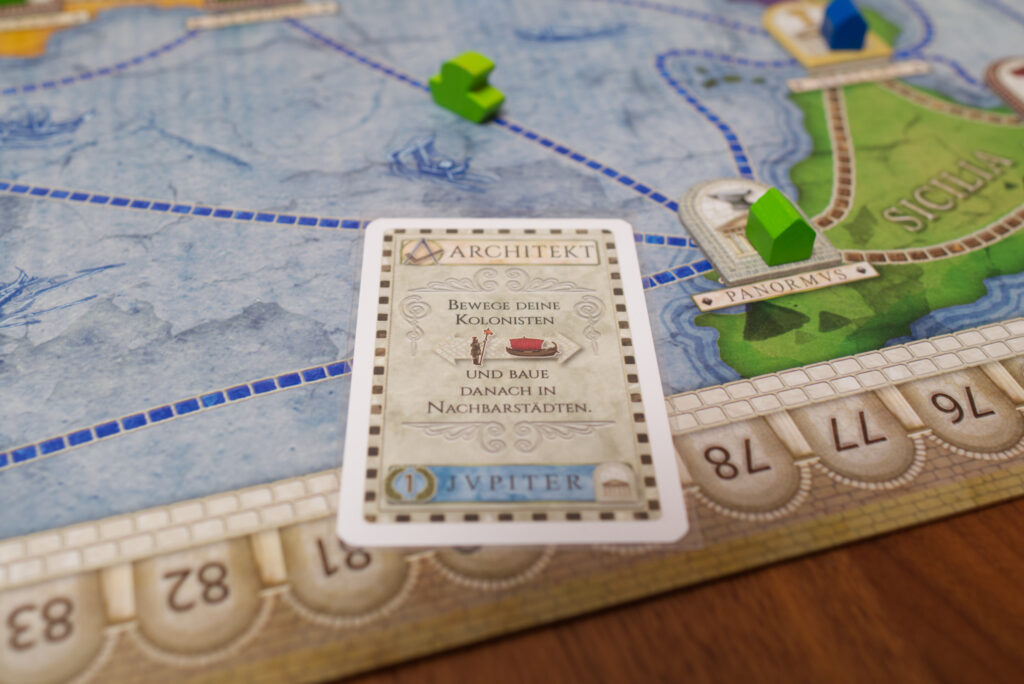
You mentioned play testing before and how important it and the polishing is. Martin Wallace said he can hardly remember anything from the design phase of Brass but still remembers how long it took to balance things. Was it similar for Concordia? The end result is so incredible clean. Every resources is exactly one coin more than the previous one. You didn’t seem to even have had that many adjustment screws to even balance things.
I tried to create sequences and inherent logic of those sequences to make the game easier and more intuitive. Five resources instead of six, each costing one more. For the balancing, the question is if a brick should cost 3? I believe we started with a brick only costing 1. So the base price of the cheapest resource is a balancing factor.
We also originally had it that the building costs of houses were a bit unclear and more complex. It’s now that you need a brick and the resource that is produced in that city and the money 1 to 5. In the earlier version you needed corn to build a tools city, tool to build a wine city, wine to build a cloth city, it was confusing. At one point I said “let’s simply make it brick plus respective resource, then people don’t have to think about it as much”. First that was met with skepticism because the previous version also had proved itself. But then it was a case of it’s simpler, also works, so lets make it so.
I continue to teach Concordia to new players or experience groups where one person doesn’t know it yet. For people that start playing Concordia, it’s: brick and a resource, okay. But a brick city, that costs a corn?!? [both laugh]. That’s a twist. There you realise it’s not that simple, it’s an exception to the normal rule. That’s a barrier. You realise that is something you have to remind people of.
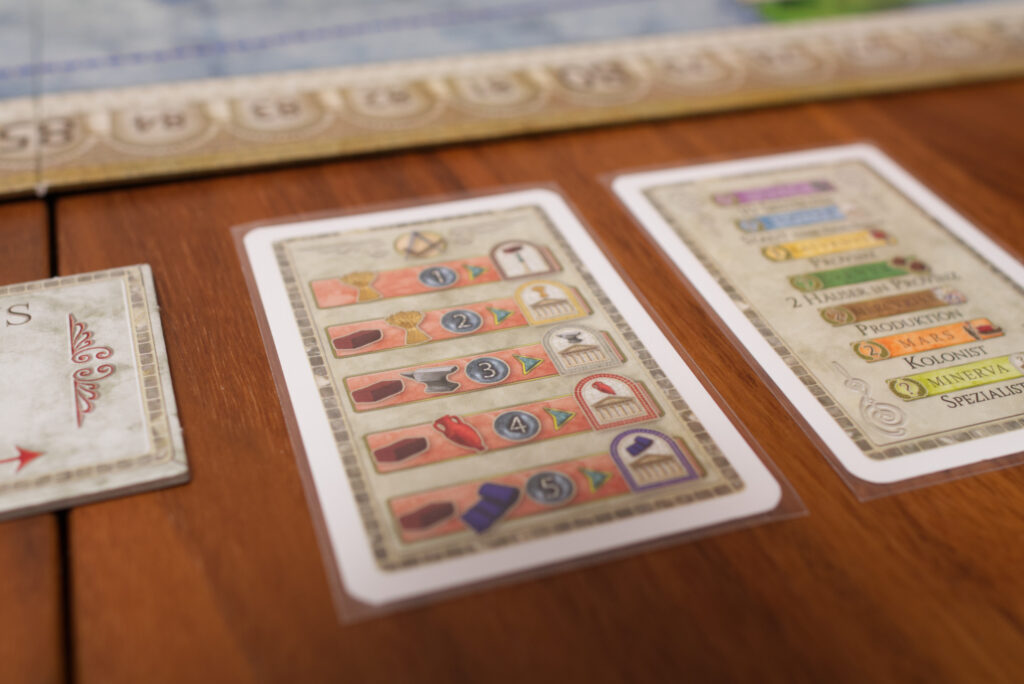
From all of the testing and balancing, does any particular feedback come to mind that was the most helpful or that bothered you?
No, it was a three year process and it was over ten years ago. Nothing comes to mind. I mostly remember the things I already mentioned. The map was also originally a different one. At first it was only the Near East, the Eastern middle sea. The original ideas was to send caravans around for trading, so I had placed it in the Near East. But then it expanded more and more so we said “okay, let’s take the Romans and the Roman Empire”. And at one point there was a province that only had one city but that didn’t prove itself on the big map.
A few things with respect to balancing could still be re-considered. I realised that it’s more exciting and nicer if there isn’t as much space and not as many provinces but a bit more of a scramble. I enjoy the tighter maps more. Perhaps one could have done that from the beginning. It’s 12 provinces and 30 cities, that spreads it out over a lot of area. But it worked. And from the start it was very much balanced: there are 2-city provinces and 3-city provinces, and in equal amounts, 6 each.
To conclude the topic of play testing and the time before the release: did you notice anything during play testing that suggested that this game could be a big hit? Was the feedback different than for your other games?
[Mac thinks for a moment] Not really. The original versions were really bad and then, the feedback got better and better. At some point, one realised it could work out.
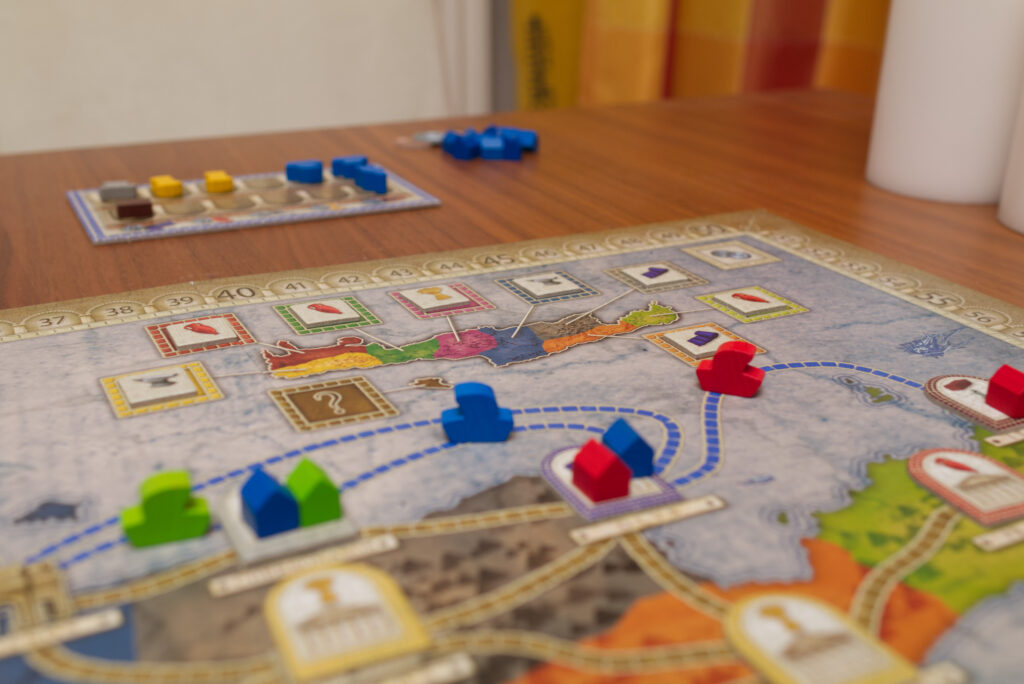
The Publisher
I remember two things from when the game was released: I was at Essen and every single one of my frequent-gamer friends I met said “Concordia, you have to check out Concordia, have you heard of Concordia?” [Mac laughs] And the second thing was “PD Verlag, what’s that?”. Perhaps lets start with the latter. How did the PD Verlag evolve into your home when it comes to publishing?
That’s a personal friendship that I cultivate with Peter [Dörsam]. I met Peter when we both still went to school. We know each other for ages. And even at that stage, we already played my games and went on vacation together, bike tours, canoeing trips. We for years had been very close friends. After he finished university, he build up his on publishing company, originally for scientific books where his own teaching books were published, also with great success.
The idea to publish my games which we had played among our circle of friends, that was floating around for a while. And at some point, we said “let’s do it! Peter has the publishing company. It’s books but it’s a publishing company”.
We didn’t really know how to do it and had no experience in that whole market. Peter Eggert [founder of publisher Eggertspiel] lived around the corner, so we drove to him and we ended up working all together. He had already done a couple of smaller games, always with a print run of 500 or 1000 copies. And then we did Antike together and we went “weeeeeelll, do we reeeaaally want to do 2000 copies?” [both laugh] “… isn’t that a biiiiit much? Or 3000? Or …?”. Even for Eggertspiele, Antike was the first really big game that had a massive response. Antike made a big impact. It even got a 3rd place at the Deutsche Spielpreis.
With the success of Antike, I got somewhat known. So we took Imperial which originated in the eighties and polished and streamlined it, which was then released in 2007. That turned out even better than Antike and so I wasn’t a no-name any longer in that field. But it’s true, the real breakthrough came with Concordia. Concordia is – based on sales numbers – my absolute best game.
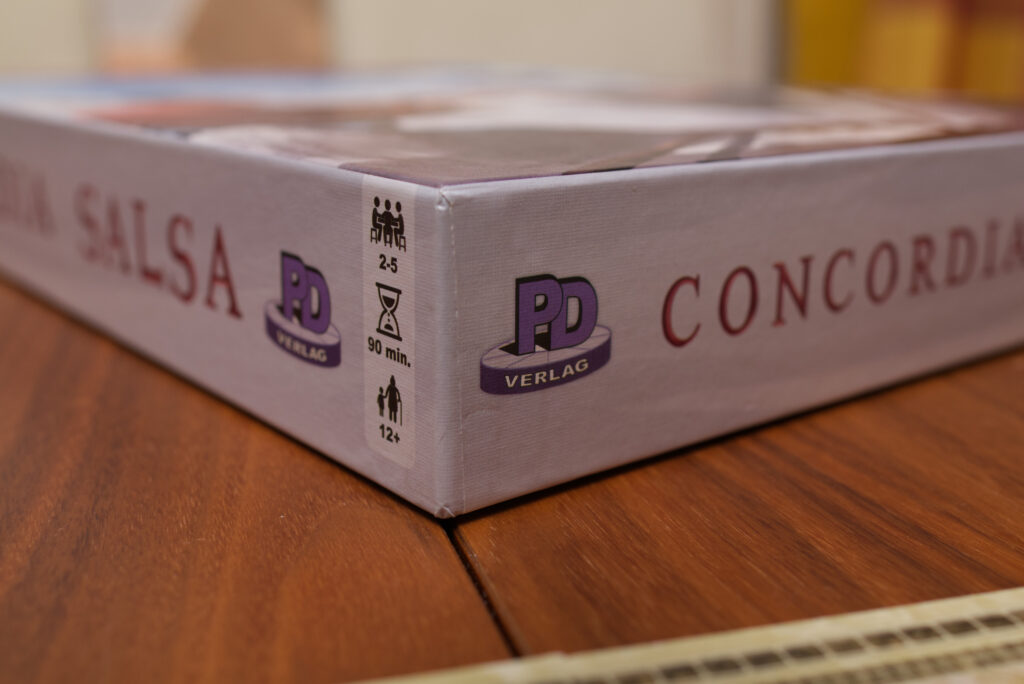
I can imagine the situation in those days, that one was anxious how big to make a print run.
Yes, but questions like where to produce, how to produce, which suppliers, what do you do on the convention, etc., all of that were things where Peter Dörsam and me had no clue. We were a team of three and did it for three years, so Imperial and later Hamburg were still published in cooperation with Eggert.
The rights for the games always remained with Peter Dörsam though. Afterwards we said let’s try it alone, now we know how to do it. It worked out well and was all amicable. After that it took a number of years before Peter took other authors in.
At first it was a mutual-exclusiveness. I made games that were published by PD and PD did games I created. And I don’t plan to work with other publishers. It just works well and we have a relationship of trust, why change? I also don’t do it to earn a maximum amount of money.
Right. The question is always what goal one has. Do I want to become a millionaire on Kickstarter or do I want that my games get into the hands of players?
Yes. I’m happy if people play my games and have fun! I really enjoy that, that’s what makes me happy. Of course I get a few Euros out of it, but that’s not the primary motivation.
What role does the publisher play? Do you finish the game and then Peter says how to produce it? Or do you “need” the publisher to give you feedback? How should I imagine your cooperation?
In the play groups it’s usually Frank, he has a contract to work as editor/developer for PD Verlag. Peter sometimes plays with us but it was way more in the early days. For a few years now he’s been elected as major for the municipality of Tostedt [a larger region between the cities of Hamburg and Bremen] where he is very much engaged, and so he needs to travel and lead an administration of over 100 people.
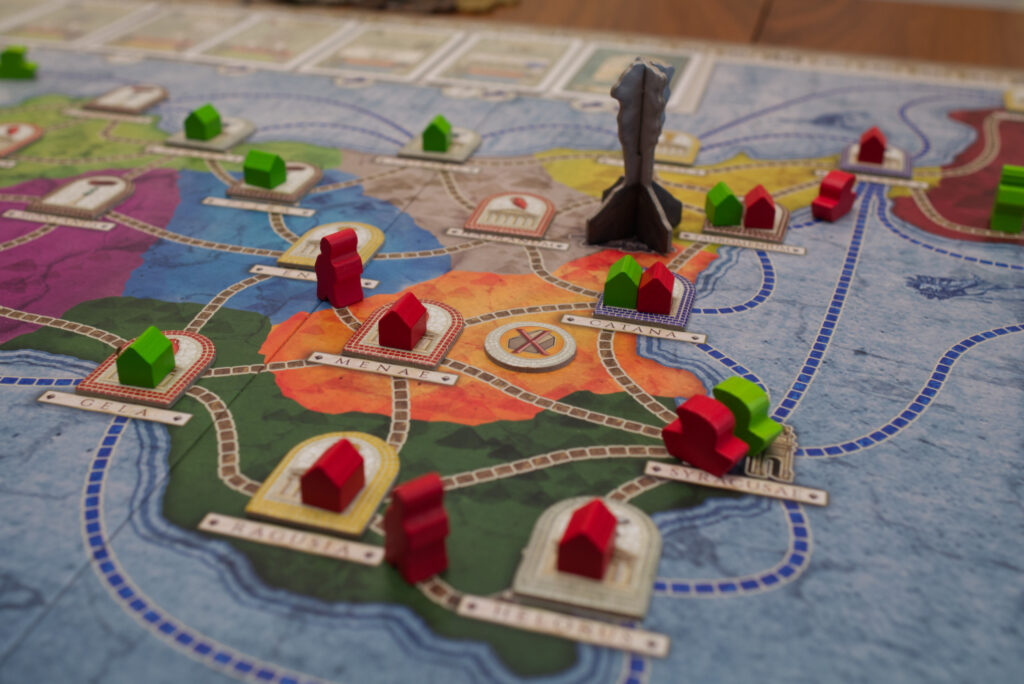
And on the side he runs a publishing house?
Well, he owns it but by now it has its own editors, a managing director, etc. So Peter leaves the operative business to them but gets involved before release to see if everything is okay. In the end, he had to delegate a lot of what he initially did himself.
I don’t know how it works for other designers, but I’m being told that it’s quite unusual with me to what degree I as a designer am involved until the release. The editorial work, writing of the rules, translation, final tweaks, and so forth, I’m always involved. It’s not like with many authors who work until they like their version, hand it off to the publisher, and then the editorial staff re-works the game again. Me, I’m involved in that process until the end and am committed. I do more than other designers because I always write down new versions of the rules, build nice new prototypes and ship them around, visit board gaming clubs, simply because it’s fun. It’s my baby. It should get the all-inclusive treatment. [laughs]
The Release
The release of Shut Up and Sit Down’s video on Concordia was a landmark moment, sort of giving it a knighthood. In that one, Quinns in the intro runs away and proclaims he never wants to play other games again.
Oh yeah, that’s a superb video, I like it a lot! It’s done really well. I unfortunately never got to know them personally. They have a certain kind of humour, I like them!
After Concordia’s release, did you notice how much impact it had when such videos would come out or what impact the high BGG rank had on the sales numbers? Was there suddenly a peak?
The nice thing about Concordia is that it still sells after ten years, which is different to most other games. They are new, get released in autumn, get sold around Christmas, and next year there are new releases. The sales curve goes down, sometimes faster, sometimes slower. We experienced that with Antike, with Navigador, a little with Imperial. Sales numbers go up and then they go down. Concordia is something that performed well over many years and still sells quite well. We feed it with new variants and expansions, new twists that keep Concordia alive because it’s simply a very nice system.
How is it when you want to do a new map: just open up the atlas, check what could work, add cities, done? Or do you need that one special idea what the next thing should be?
I really check the atlas and consider where the Romans were and which area doesn’t have a map already. Slowly it’s getting more difficult [both laugh] to find something new. The first one was obvious: Britannia and Germanica, that’s for the English and German editions. Then Gallia and Spain, followed by Byzantium, and then the islands.
Now for the 10th anniversary, we did something really special with Roma, the capital of the Roman Empire. That one plays completely different. You’ve also written about it – which was very nice to read, glad you enjoyed it.
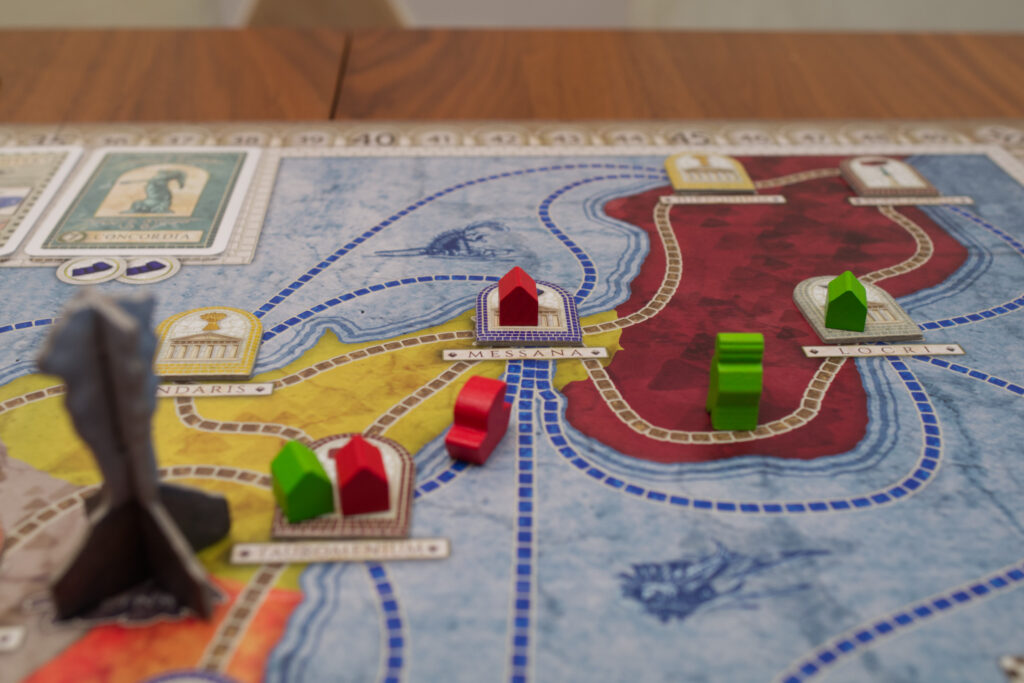
We already mentioned 10 years of Concordia before. I had almost expected that you would do a big Kickstarter, deluxe resources, three new maps, wooden box, and so on and that you would gather a lot of money. Was that even a consideration?
Yes, the publisher had similar thoughts of making a deluxe version but … somehow they didn’t finish yet [both laugh]. Yes, there are first approaches, new graphics one could use, I don’t want to spoil too much, things are being worked on. But it just didn’t see the light of day for the tenth anniversary.
There was the thought of whether Roma should become the deluxe version but in the end Roma is viable by itself. Most importantly we don’t want to disappoint the players, so we don’t to rip-off anyone. If we would have said Roma is the deluxe version and you could only play it if you buy the expansive deluxe version, that wouldn’t have worked either. It’s meant as a normal expansion, not overpriced but for a fair price so that people like to buy and play it.
I heard you once say in another interview that Concordia is being produced within 500km of Essen or something along those lines. Is that important to you to have local production?
No, that’s something the publisher deals with. When it comes to questions of production, I maybe sometimes help check the colour palette but where-what-when is ordered and supplied from, that’s the job of the publisher. That’s nothing I work on.
But it’s true that Made in Europe has its advantages. Production in China is of course cheaper, but it takes longer for it to arrive here and there is a substantial amount of uncertainty. I hear stories from other designers. Martin Wallace once told the story of a game not getting released on time because it was shipped to the wrong Chinese harbour. Or other people had problems that things got stuck in customs. Someone a couple of years ago – I don’t remember who – had ordered something in China and the box was too small [Alex laughs] The box and components were in plastic wrap but the components did not fit into the box. Something like that doesn’t happen that easily in Europe.
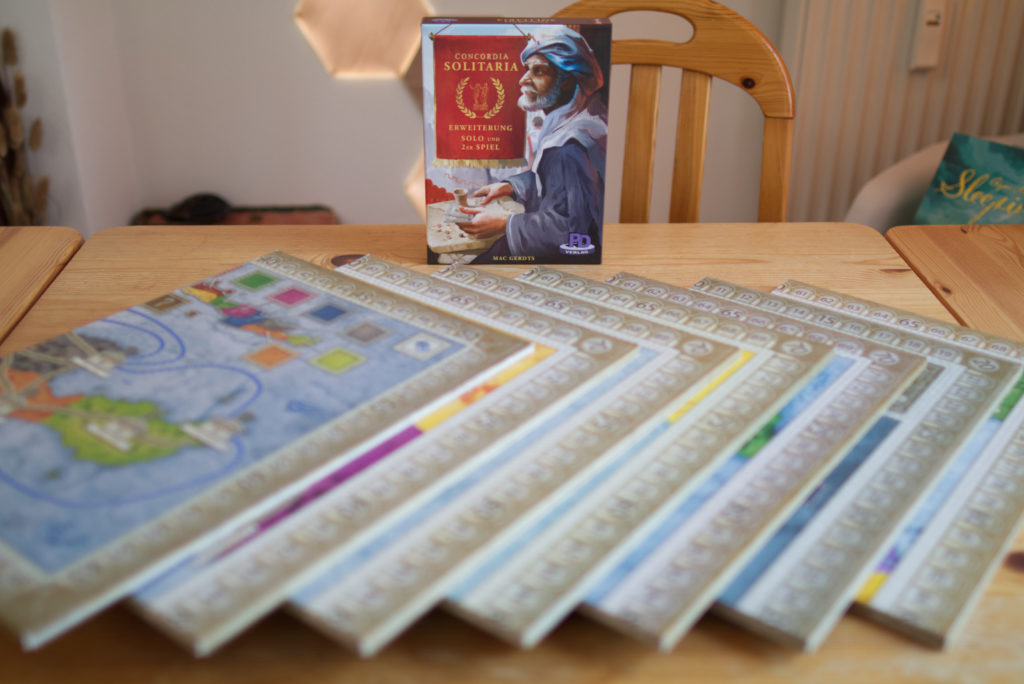
New Maps: Roma / Sicilia
I thought perhaps it even helps you for example for Roma / Sicilia to do tweaks up to the last minute and two weeks before Essen get it printed.
I was two months on a bike trip this summer! I was on the road in July and August and had gotten everything ready before then. But while I was traveling, there was still work being done on the graphics and the last rules change so that during the refresh of the city districts with the prefect one receives a movement on the ship track. That was the last idea. That one I got just before my vacation and gave it to Frank and said “let’s test it please, I think it’s good, but I’m off on vacation now”. [both laugh] Nowadays I have my mobile phone with me, so I was on vacation but I stayed in contact. And so I got feedback [jokingly in a sort of not-a-big-deal sound of voice] “yeah, it’s okay, it works, we’ll add it”.
[Alex and Mac both have to laugh even more because it’s another one of those twists that adds so much value to the depth of decisions in Roma that it is hard to imagine it almost wouldn’t have been included]
I wanted to have a long vacation and switch off everything so I didn’t participate in the last test but followed it a little from my vacation.
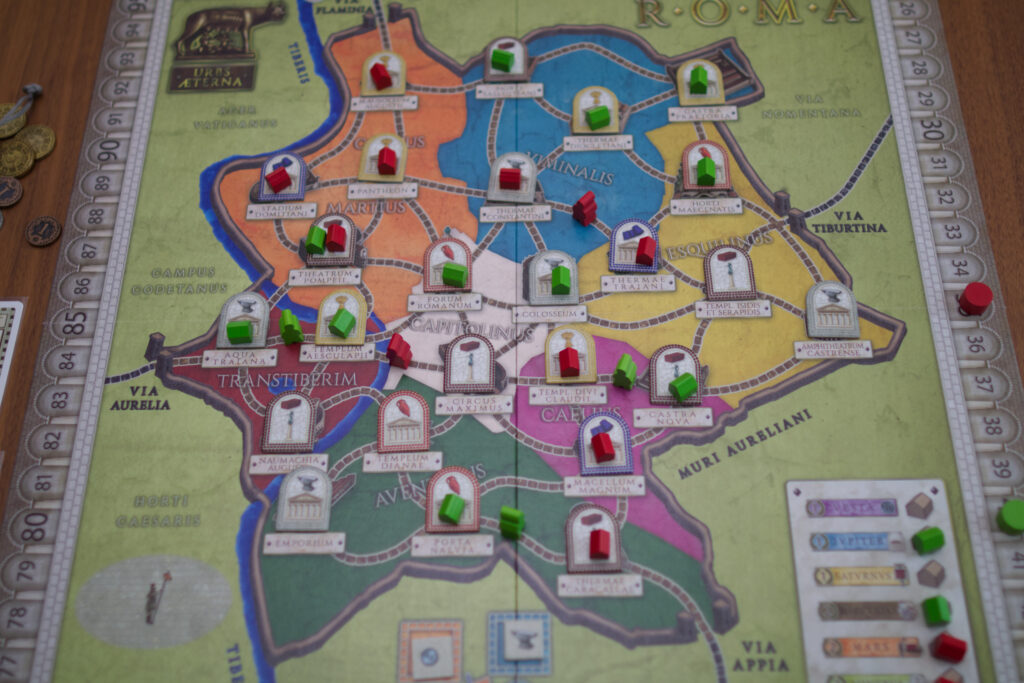
Such a decisive change! This small twist opens up completely new possibilities. I don’t want to call it a master piece, but that raised the bar a lot.
Also using it pushes people onto what’s possible with the ships. Otherwise it can happen in certain play groups that they don’t consider the ship track and it flies under the radar. But if you get pushed onto it – because at some point you will refresh the production and then you take a step with a ship – then you are forced to think about it. And the last action a ship can do when it ends up in Byzantium is that it can score a deity, then – in the middle of the game – you get pushed onto what the deities mean and how much the cards are worth. That otherwise isn’t the case in Concordia. There is a final scoring and a lot of people are then surprised. So [using that mechanism] you are forced during the game to grapple with the functions of the cards, that was also a thought I wanted to have in the game.
It’s almost like in video games where you learn aspects of the game by playing it.
Yeah, so people that are not as familiar with the game understand the value of the deities. Usually you only understand it once you’ve played the game a couple of times. The first time, it’s flying blind.
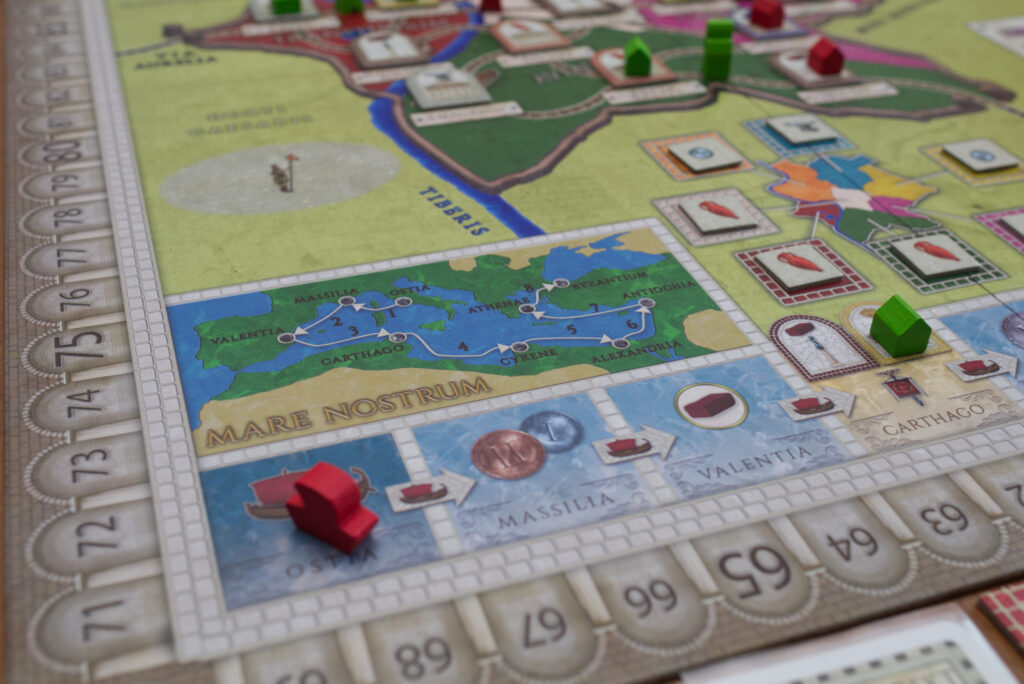
For me, this expansion is a highlight among all the maps that exist. Do you still have aspects you want to integrate in the Concordia system? Or things you tried out and wished you could add them but it didn’t work out?
[thinks for a while] It’s not like that I have thousands ideas that must be in the game. It already is a very rounded game where as time passes one gets ideas of what one could do. I don’t have a master plan in my head for the next ten expansions or something like that. It just happens over time.
I’m thinking about whether or not one could use the system of Concordia but place it in a different setting. So it’s not a trading game in ancient Rome but trying something different thematically. I received a hand written letter from the US a while ago which said I should do a Concordia for the area of the great lakes. [laughs] That doesn’t really fit, [jokingly] it’s thematically too absurd to grow wine and praise Jupiter at the great lakes. But whether it is the great lakes or another area or another era in time, perhaps one can use the system of Concordia and create something new from it. I don’t want to spoil too much what’s in the works.
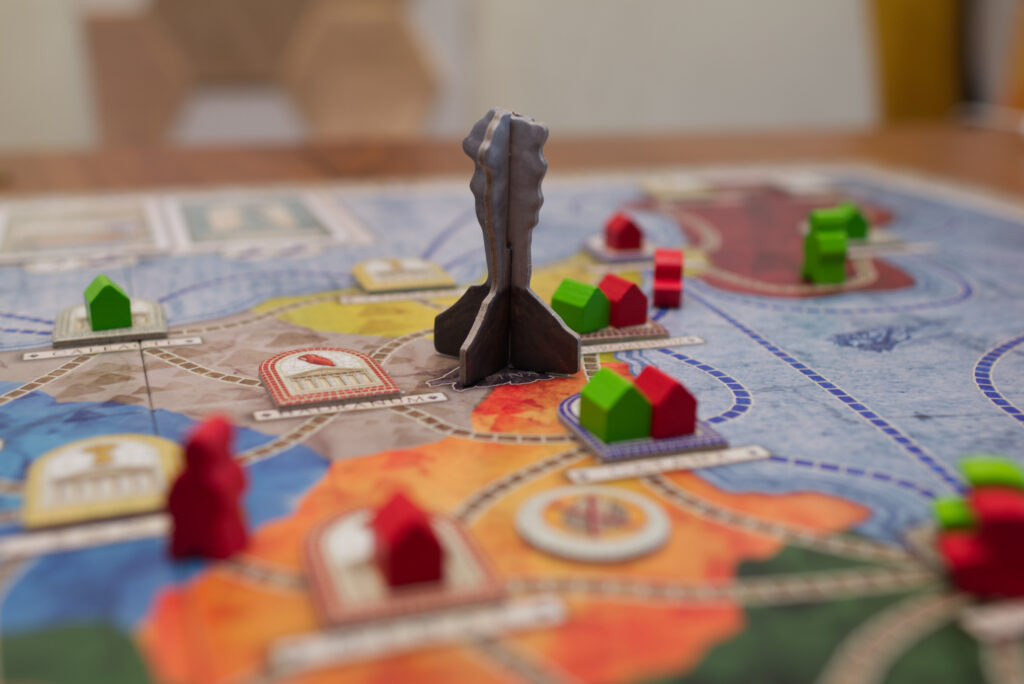
Lighting Round
To wrap up, I like to do a lightning round: a couple of quick questions and you would give your impulse. Do you have a tip for players that have played Concordia 3-4 times where you would say try the following, perhaps you haven’t thought about it?
My tip is to not worry too much about how many points you have right now and how many the other players. Simply play. There are people that say they are flying blind, “I don’t know how many points I have during the game”. When you play the Steam version – the computer version – where it shows you the points during the game, you realise how irrelevant it is how many points you have during the game because during the last 2-3 rounds you can move from last to first place if you have correctly timed it, correctly prepared it. As a result, the points during the game are not that decisive and so to the people who are concerned about that, wondering if they have 3 points more than the other player: that will completely have changed two rounds later.
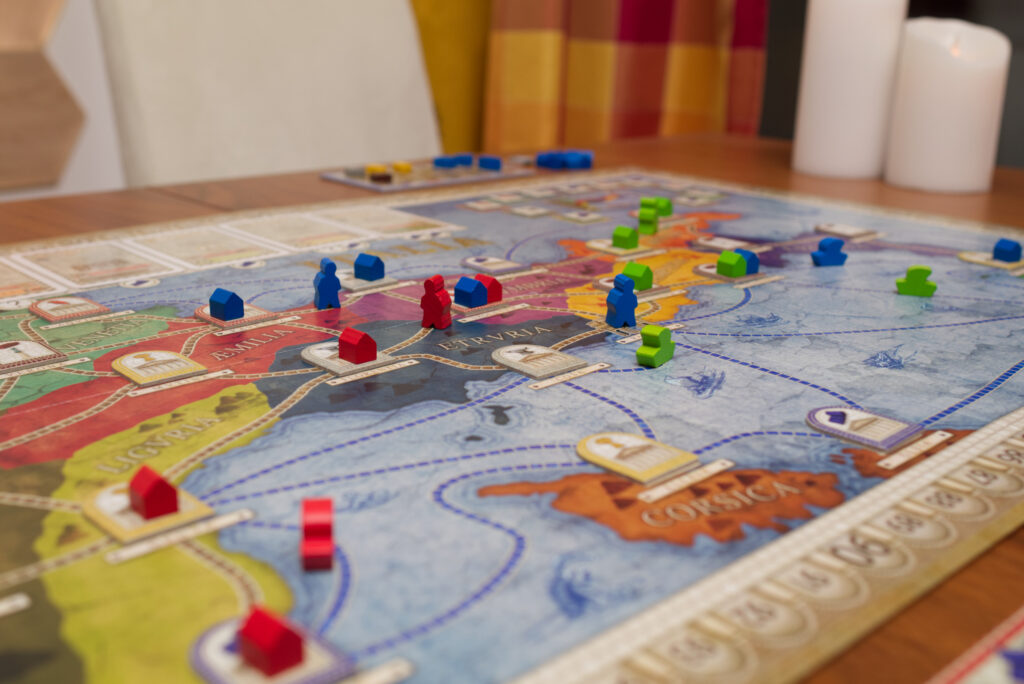
Do you have a preference for getting rid of your houses or pushing to buy the last card in the market?
That totally depends on the situation. Every Concordia is different. It depends on where the cities are: are 3-4 tool cities close to each other, then I want the blacksmith. And if I can cheaply get both the farmer and the mason, then my strategy is clear: buy lots of cheap houses, and that will fuel itself, as well as trying to finish the game before others can empty out the card market.
Other times you might be in a situation where you have 7-8 cities, have every resource and play towards buying all Mercators because they provide a lot of points, they each give 10 points which is more than you get with other cards. So you need to act depending on the situation. You need to read the map: where are the cities? When do which cards come into play? Which do you have access to? And then seize opportunities.
Other times it can be that the strategy to build lots of houses is good and it works better when it’s the cheap houses of course. Or buy a lot of cards of one kind. A popular strategy is to play towards Colonists. If you manage to buy multiple Colonist cards, it’s of course obvious what you’ll do. Then you don’t bother building cities or buy cards but try to build colonists and then building cheap cities will result out of it by itself.
There’s nothing that I would fundamentally recommend. I would advise to look at the map, how the cities are distributed, how do the cards enter the market and try to see combinations and opportunities and follow up on them consistently. Perhaps very generally the advise to not fritter. Don’t try to do everything, then nothing will work. A strategy will crystallise during the game and that needs to be followed.
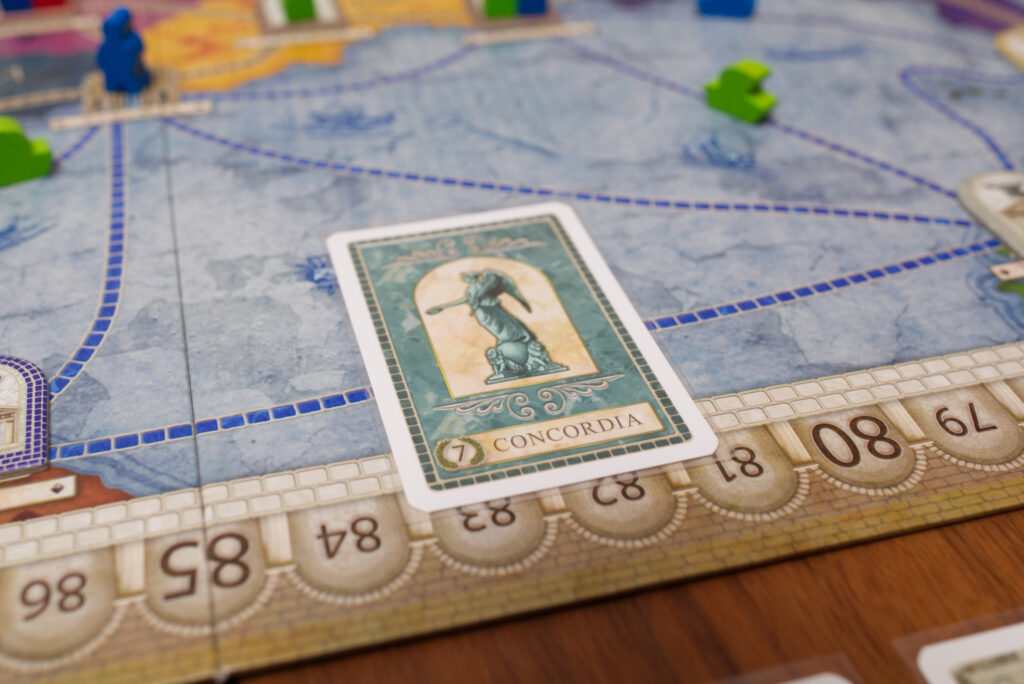
Do you have a favourite combination of Concordia, this map with that expansion?
I like to play Roma, of course also because it is new. Among the traditional maps, I still like to play Britannia after all this time, I think that’s a nice map.
Do you play with fish market or without? With salt or without?
I like to play standard. It also depends on who you are playing with, it depends a lot on how the group is. The team play for examples is something you can’t do with everyone, you need people that can engage with it.
For me it’s Solitaria, Creta or Sicila, not sure yet, without fish market, without Salsa. So rather standard but with the wine-cloth market. That’s the combination I found for myself. I’ll make myself a nice cup of tea [Mac laughs because making tea is so typical for people from northern Germany] and I have my fun.
That’s where tastes are different. “De gustibus non est disputandum” as the Latin speaker would say.
What does that mean?
You can’t argue about taste. [both laugh]
Those are great closing words!
Many thanks to Mac Gerdts for taking the time to sit down with me. If you want to dive into the world of Concordia, I can wholeheartedly recommend Solitaria if you are playing solo or with only 2p as well as the Creta / Aegyptmus expansion for a tighter play experience than the base maps. Concordia veterans should check out the new expansion Roma / Sicilia which has been released at Essen 2023 and is now coming out in retail.
Thanks also to Hilda Hirsch for proofreading the English translation.
If you enjoyed reading this, please leave a feedback in the comments. Doing in-depth interviews like these takes a lot of prep & research and it’s really rewarding to see that so many of you seem to enjoy reading them. Showing your support helps getting future interview partners on board! You can find more interviews like these in the interview section.
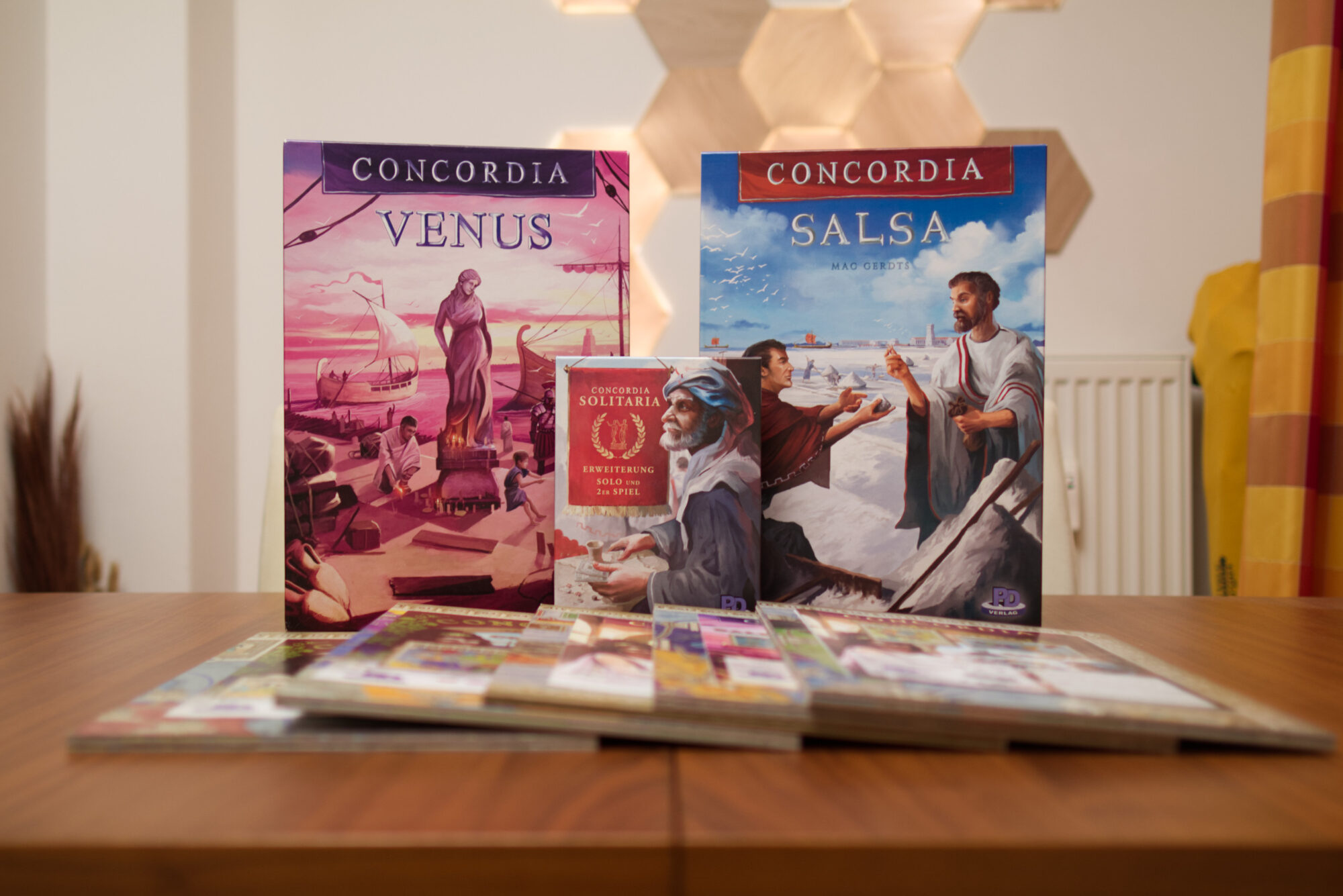
Thanks Alex.
Fantastic interview.
The analogy with diamond polishing gives a good idea of the care that Gerdts puts into the development of his games.